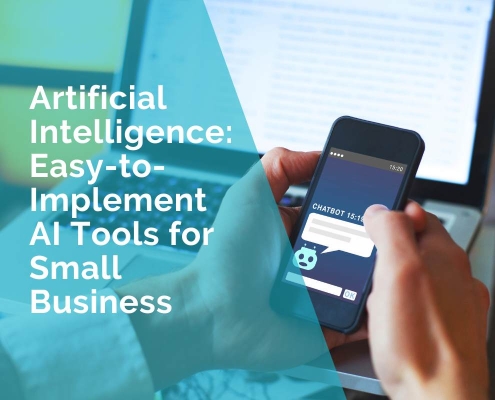Managed IT Services as the Backbone of Digital Customer Experience
Managing digital customer experiences can feel overwhelming. Slow systems, security breaches, or unexpected downtime often leave businesses scrambling for solutions. These issues hurt your reputation and drive customers away faster than you can say “technical glitch.”
Here’s the good news: Managed IT services simplify handling these challenges. A study by Deloitte found that companies using managed services spend 30% less on IT issues while enhancing operations.
This blog will explain how managed IT services address common problems and improve customer experiences. Keep reading to discover how they become your hidden advantage in the tech-driven world!
Enhancing Digital Customer Experience with Managed IT Services
Managed IT services keep your technology functioning efficiently, enhancing customer satisfaction. They resolve issues promptly and adjust to evolving business requirements effortlessly.
Proactive monitoring for seamless interactions
Constant system checks prevent unexpected downtime. By regularly monitoring IT operations, minor glitches get resolved before they interfere with the customer experience. For example, network monitoring tools can identify unusual traffic spikes and minimize delays before customers are affected.
‘Addressing minor issues early spares businesses from major challenges later.’This approach ensures consistent digital services while safeguarding revenue streams. It also eases pressure on technical support teams, allowing them to spend less time on urgent fixes.
Rapid issue resolution with expert support
Technical problems can delay operations and irritate customers. Managed IT Services promptly tackle these challenges with experienced professionals prepared to step in. For businesses unsure where to begin, it’s wise to check with 7tech’s experts, who can guide on building a reliable IT helpdesk support. They fix issues effectively, reducing downtime and maintaining smooth system operations
Specialized teams manage everything from network errors to software problems. With continuous availability, they ensure businesses receive assistance precisely when required. This swift response helps sustain seamless customer interactions while allowing internal teams to focus on other important tasks.
Scalable solutions for evolving customer needs
As businesses grow, their IT demands often increase. Managed service providers anticipate this by offering adaptable systems that align with changing requirements. For instance, Cantey, a premier MSP, provides scalable solutions that allow companies to expand resources such as server capacity or helpdesk support without lengthy delays.
For example, cloud computing helps companies modify storage or processing power based on traffic spikes. This approach ensures businesses can manage growth efficiently while avoiding unnecessary costs for unused services.
Role of Managed IT Services in Digital Transformation
Managed IT services make it easier for businesses to update their technology. They ensure systems operate efficiently while assisting companies in meeting current requirements.
Modernizing IT infrastructure for efficiency and reliability
Updating IT systems reduces downtime and enhances performance. Businesses avoid outdated hardware that hinders operations and risks failures. Cloud computing offers adaptability, allowing companies to adjust quickly to growth demands without heavy upfront costs.Regular system updates defend against security threats and keep networks functioning efficiently.
Efficient infrastructure improves reliability in customer interactions. Quick response times build trust while minimizing interruptions, increasing client satisfaction. A well-organized IT setup also simplifies network management for teams, helping them concentrate on progress rather than resolving issues daily. Dependable technology forms the foundation of a successful business.
Implementing personalized digital solutions for engagement
Modernized IT infrastructure sets the stage for creating meaningful customer interactions. Businesses can use managed IT services to design digital tools that cater to specific customer needs, preferences, and behaviors.
Businesses can integrate data analytics to understand what their customers truly want. Custom applications or portals simplify interactions, making them more intuitive and efficient.
Managed service providers help craft these solutions while keeping technical support available round-the-clock. This approach not only increases satisfaction but also fosters long-term loyalty.
Leveraging managed cloud services for flexibility
Managed cloud services enable businesses to easily adjust IT resources based on demand. Companies can increase resources during busy seasons or reduce them when activity slows down.This prevents unnecessary costs and enhances resource efficiency.
Cloud-based systems also support remote work and collaboration across locations. Teams access files, applications, and platforms at any time without interruptions. Businesses no longer depend on bulky servers that restrict growth or mobility.Service providers assist in managing these transitions effectively, ensuring operations remain stable and secure.
Building Trust and Security
Protecting data builds confidence, but keeping systems safe keeps customers coming back—let’s explore how.
Protecting customer data with managed security services
Managed IT services enhance customer data protection by applying advanced cybersecurity measures. They continuously monitor networks, identifying and stopping potential threats in real-time.
Service providers rely on encryption to protect sensitive information during online transactions or storage. Routine system updates address security gaps that malicious actors might exploit, keeping businesses ahead of cyber threats.
Technical professionals conduct risk assessments to uncover vulnerabilities before they escalate. Firewalls and intrusion detection systems establish defenses against unauthorized access.
Data backup solutions ensure swift recovery if attacks occur, minimizing downtime and losses. This strategy instills customer confidence in the confidentiality of their private information, while enabling businesses to focus on growth without concerns over breaches diverting attention.
Ensuring consistent and reliable digital experiences
Stable IT systems keep businesses running efficiently. A managed service provider oversees networks and resolves issues before they interrupt operations. This minimizes downtime, which is essential for maintaining a positive customer experience.
Experienced teams manage upgrades and maintenance without disturbing daily activities. Reliable performance ensures customers experience quick load times and hassle-free interactions whenever they use your digital platforms.
Business Efficiency and Focus
Managed IT services take care of technology challenges, allowing businesses to focus on their core strengths—expanding and succeeding.
Streamlining processes through IT optimization
Improving IT processes enhances efficiency and saves valuable time for businesses. Managed Service Providers use technology solutions to simplify complex operations.
- Automate repetitive tasks to minimize manual errors and accelerate workflows. IT automation tools handle tasks like software updates and server maintenance efficiently.
- Monitor systems continuously to avoid delays caused by technical glitches. Ongoing monitoring identifies potential problems before they impact business operations.
- Combine IT infrastructure to remove inefficiencies. For instance, integrating multiple tools into one platform simplifies management and reduces expenses.
- Minimize downtime with quicker issue resolution through advanced ITSM tools. Prompt fixes keep your team focused on delivering results without interruptions.
- Simplify communication between departments by centralizing access to shared resources. Improved collaboration increases productivity across the board.
- Improve data accessibility by migrating systems into managed cloud services, making files available anytime and from anywhere for employees or clients.
This foundation also supports the flexibility needed for focusing on core activities discussed next.
Allowing businesses to focus on core activities
Managed IT services handle technical support and IT operations, saving businesses time. Companies can outsource tasks like network management and cybersecurity solutions to providers who specialize in them.
This reduces the strain on internal teams. By outsourcing technology solutions, companies focus more on business growth. IT service management ensures efficient processes without constant interruptions or distractions from tech issues.
Conclusion
Strong IT services drive great customer experiences. They keep systems reliable, secure, and prepared for growth. Businesses can focus on what they do best while tech experts manage the rest. This collaboration ensures smoother operations and happier customers every step of the way.
***
Tippo Sultan










